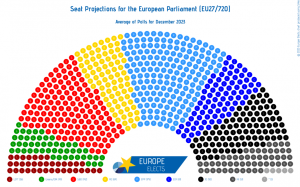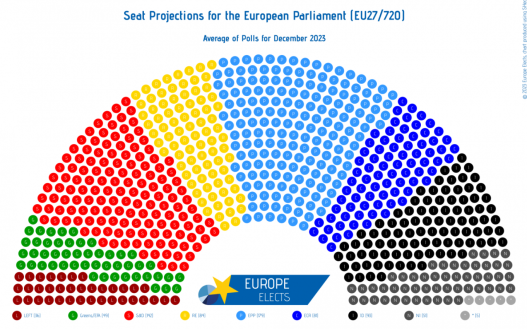
SO ARE THE POLLS FOR THE 2024 EUROPEAN ELECTIONS: STRONG RISE OF THE FAR RIGHT
The projection by the NGO Europe Elects gives an indication of how voters in the European Union would vote if polling day were election day, in this case, for the European Parliament. Its report is based on polls published in EU countries.
According to the Europe Elects projection, in December 2023, for the first time in the last four years, in the published polls there is a reorganization of what would be the three main groups in the European Parliament. Only in December 2019, the group of the Reformists and Conservatives ECR, was briefly in third place, but this month the other right-wing party – Identity and Democracy ID -, moves to one of the top positions.
The leading group and election winner remains the center-right European People’s Party (EPP), which gained four seats to 179, its best result in almost two years. They are followed by the center-left Progressive Alliance of Socialists and Democrats (S&D), which is unchanged from November and holds 141 seats. Renew Europe (RE), the centrist-liberal group, suffered the biggest loss last December. They are expected to lose five seats, their second consecutive defeat. This leaves them with only 84 seats, their weakest result since the party was founded. It also means that they would now become the fourth largest group in the European Parliament.
Together, the three parties, which form a loose coalition in the European Parliament, now have 404 of 705 seats, a comfortable absolute majority with one seat less than last month.
As noted, the third largest group would be Identity and Democracy (ID). After overtaking ECR last month, the right-wing group has now also overtaken the Renew Europe liberals. They gained six seats in the Europe Elects projection and now have 93 seats, the highest number in their history. The nationally conservative European Conservatives and Reformists (ECR), on the other hand, have lost two seats to 81.
On the left, the Greens/European Free Alliance (G/EFA) are expected to win 49 seats, down two from last month, while the GUE/NGL (LEFT) group is expected to lose another seat, leaving it with 36 seats, its all-time low. The Non-attached (NI) would have two fewer seats to remain at 52, and the unaffiliated parties are expected to have six seats, an increase of two.
These figures, with a 95% confidence rating, show that the EPP would take first place and S&D second if an election were held this month. Third place is up for grabs for three groups: ID, RE and ECR are too closely matched to have a clear outcome at this stage. Places six and seven would go to NI or G/EFA, as both are also projected at similar levels. The eighth largest group would be the LEFT, and the smallest of all would be the unaffiliated parties, which are not currently represented in the European Parliament.
CHANGES IN VOTING INTENTIONS IN THE MEMBER STATES
The main gains for the ID group came from two parties at opposite ends of the continent: in the Netherlands, the Partij voor de Vrijheid (PVV) continued to rise in the polls after its election victory and is now expected to win two more seats. And in Romania , the new ID member Partidul SOS România (SOS RO) would win two seats in the EU Parliament.
Losses in the RE group come from the same countries: the Dutch Volkspartij voor Vrijheid en democratie (VVD) and the Romanian USR are expected to have two fewer seats than in November.
There is also a change in the EPP group: the Dutch BoerBurgerBeweging (BBB) group becomes affiliated with the EPP and gains two seats. The German Christian Democratic Union (CDU) also gains two seats, while the Polish Obywatelska Platform (PO) of new Prime Minister Donald Tusk is expected to lose two seats.
The S&D group also has two two-seat changes: the Social Democratic Party of Germany (SPD) of Germany is expected to lose two seats and the Socialist Party (PS) of Portugal is expected to gain two seats.
Elections for the European Parliament will take place between June 6 and 9, 2024. 720 MEPs will be elected for a five-year term. Each of the 27 EU countries can have a minimum of 6 MEPs and a maximum of 96.
MEPs represent the 450 million people living in the EU. Among other functions, they study plans for new laws that will govern the 27, or amend existing ones.
They also decide on the EU budget and vote on trade agreements with non-EU countries.
They also elect the president of the European Commission.
—-
This article was originally published in Aquí Europa, with whose permission we reproduce it.



